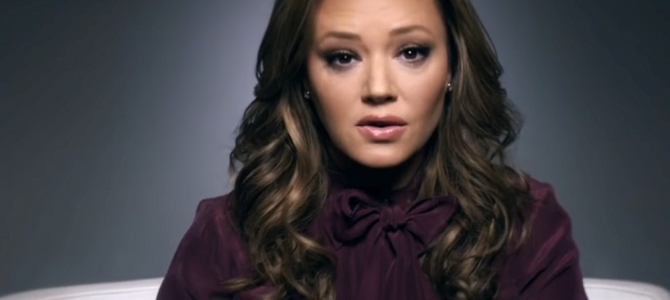
Last week A&E aired not one, but two new episodes of its series exposing Scientology, “Scientology: The Aftermath.” Both shed light on the darkest elements of the group, which the series charges has terrorized and even caused the deaths of opponents and followers alike. What makes Scientology a cult instead of just an extreme religion? These two episodes explained the difference better than any of the previous episodes.
The first new episode was an aired edition of a Reddit AMA (Ask Me Anything) in which actress Leah Remini answered viewers’ questions about the cult. She sat opposite the former International Spokesman of Scientology and one of its most famous defectors, Mike Rinder, and interviewed a series of the most famous foes of Scientology, including the subject of a groundbreaking book, entitled “The Unbreakable Miss Lovely.” It’s from perhaps the most famous contemporary Scientology chronicler, a journalist who first exposed the group.
Other guests included Karen de la Carriere, the ex-wife of Scientology President Heber Jentzsch and mother to Alex Jentzsch. Karen squarely blames Scientology for Alex’s untimely death. This episode was a last-minute addition to the rotation of eight episodes A&E filmed in Remini’s series, which is the first of its kind about the “religion” on television.
Introducing Head Honcho David Miscavige
Last Tuesday night, as scheduled, A&E aired the second episode, profiling the current leader (or the pope, as Rinder says he calls himself) of Scientology, David Miscavige. Although Tom Cruise is the most famous member of Scientology, up until episode four Remini spent almost no airtime focusing on the movie-star face of the “church.” The opening of the fourth episode, however, uses Cruise’s words to introduce Miscavige to A&E’s audience.
The video is of a pep rally. In it, Cruise introduces his friend and religious leader, telling the booming audience present for the 2004 award ceremony for the “IAS Freedom Medal of Valor”: “I want to tell you something. I have never met a more competent, a more intelligent, a more tolerant, a more compassionate being. I have met the leaders of leaders. I have met them all. So I say to you COB [Chairman of the Board], we are lucky to have you, thank you.”
Miscavige’s official title in the Church of Scientology is chairman of the board of the Religious Technology Center. But who is he really? Rinder described him another way: “the undisputed dictator of Scientology.”
Miscavige executed a takeover of Scientology’s leadership after the death of its founder, L. Ron Hubbard. What makes Remini’s series unique from other shows on Scientology, such as the HBO documentary “Going Clear,” is that it is from the perspective of former Scientologists and focuses on their experiences exclusively. It explores what it is like being part of a religion at the upper echelons with Miscavige at the helm.
Remini and Rinder interviewed Jefferson Hawkins, the former chief propagandist for the group, who says he left after Miscavige assaulted and terrified him. During this interview, Remini explains to her fellow defectors the desperation she feels about exposing and taking down Scientology by any means necessary, including flooding its headquarters with airplane-dropped pamphlets and bringing in law enforcement.
‘Scientology Does Not Work’
Rinder also provided several analogies for how incremental change can alter a culture, including civil rights marches and television shows about gay relationships, both of which changed public opinion enough to sway U.S. laws. What might have been an even more apt analogy is that of the plethora of media coverage about the abuses in the Catholic Church.
Many former Catholics can attest that seeing their religious leaders as not just human, but extraordinarily flawed and sometimes evil, drove them from the pews. The flood of stories about abuses by Catholic priests and bishops brought the church to its knees across the world, especially in the United States. If the abuses of religious leaders of a thousand-year-old religion can cause this kind of damage, what could they do to an already flawed group like Scientology?
Hawkins, Rinder, and high-level defector Tom DeVocht said seeing the leader of their church abuse his power played a key role in their decisions to leave and later speak out against Scientology. Remini asked DeVocht, “What was the thing after 28 years… what was the thing?”
DeVocht answered “Miscavige, Miscavige, Miscavige. I’ll tell you why. Seeing the organization had ripped the f— apart, and it was strictly about Miscavige’s power. It crumbled, everything. The whole picture of what I thought I was involved in crumbled before me. But more than anything was the realization that the whole thing is a farce, there’s nothing workable about it. Scientology does not work.”
During the AMA episode, Remini explained her greatest hope for the series is that law enforcement and legislators might take an interest in Scientology’s abuses. If practicing Scientologists are exposed to the fourth episode exploring the humanity and evil of David Miscavige, however, it may contribute to a potential exodus from the group that could lead to its implosion from lack of money and followers.









